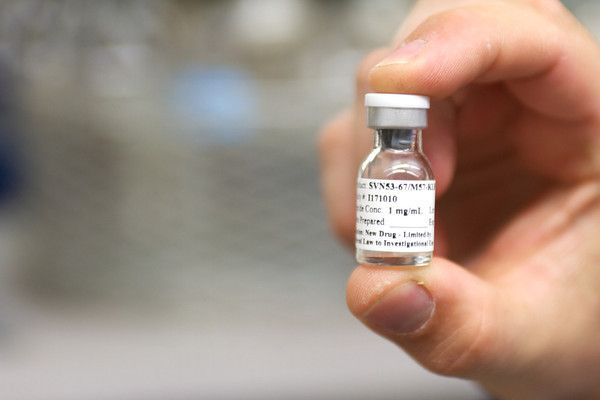Team led by Roswell Park researchers zeroes in on role of tumors’ genetic signatures
- Immunotherapy developed at Roswell Park targets deadliest type of brain cancer
- Duration of survival linked to interferon and intratumoral B-cell signatures
- Findings could help identify those most likely to benefit from immunotherapy
BUFFALO, N.Y. — Results of a study led by researchers at Roswell Park Comprehensive Cancer Center are shedding light on why some newly diagnosed glioblastoma patients survive longer than others after receiving standard treatment in conjunction with the therapeutic brain cancer immunotherapy SurVaxM. The team’s findings, newly reported in the journal Cancer Immunology & Immunotherapy, linked long-term survival to the tumor’s molecular characteristics prior to treatment.
Glioblastoma is the most common, aggressive and deadly type of brain tumor, with fewer than 7% of patients surviving five years after diagnosis.
“There is an urgent need for more effective treatments for glioblastoma, which claims about 10,000 lives in the U.S. every year,” says Michael Ciesielski, PhD, Assistant Professor of Neurosurgery and Director of the Neuro-Oncology Lab at Roswell Park. He and Robert Fenstermaker, MD, Professor of Neurosurgery and Oncology and Chair Emeritus of the Department of Neurosurgery, co-developed SurVaxM and are co-senior authors of the study.
The findings are based on the results of a single-arm phase 2 clinical trial in which 63 patients underwent surgery and chemoradiation and received the chemotherapy temozolomide followed by a series of SurVaxM injections. Investigators used whole-exome and RNA sequencing to identify genetic variations and levels of gene activity in the pre-treated tumors of 34 of those patients. They then compared the tumor profiles of patients who had short-term overall survival (fewer than 18 months) versus long-term overall survival (more than 18 months). They found that the tumors of long-term survivors contained especially high proportions of B cells and T cells — part of the immune system’s cancer-killing arsenal — and enriched gene sets for interferon-gamma (IFN-γ) and interferon-alpha (IFN-α), which help the immune system launch a stronger attack against the tumor.
The authors noted that a five-gene expression signature and B-cell-specific signature predicted length of survival in the patients who received SurVaxM, but the same tumor characteristics were not associated with improved survival in a group of patients who underwent similar treatment but did not receive immunotherapy.
“Our findings suggest that analyzing patients’ tumors before treatment could help us identify those who would be most likely to benefit from SurVaxM or other types of immunotherapies,” says Dr. Ciesielski.
SurVaxM targets survivin, a protein found in 95% of glioblastomas that is essential to their survival. Evidence to date suggests that the immunotherapy helps prevent recurrence by stimulating the patient’s own immune system to find and destroy cells containing survivin. Ten patients have survived seven years or longer after receiving SurVaxM, including five patients whose disease has not recurred.
Because survivin is also present in many other cancers, SurVaxM is also being evaluated in clinical trials for adult patients with neuroendocrine tumors and multiple myeloma, and in pediatric patients with specific brain tumors.
Henry Withers, PhD, of the Biostatistics and Bioinformatics Department and Sheila Figel, PhD, of the Neuro Oncology Department at Roswell Park are co-first authors of the paper. The team included researchers from the Miami Cancer Institute, Dana-Farber Cancer Institute, Massachusetts General Hospital Cancer Center, Beth Israel Deaconess Medical Center, Rose Ella Burkhardt Brain Tumor Center, Cleveland Clinic Neurological Institute and Brown University Health Cancer Institute.
The study was supported by grants from the Roswell Park Alliance Foundation, Philip H. Hubbell, the Linda Scime Endowment, MimiVax Inc. and through National Institute of Health (NIH) awards to Roswell Park from the National Cancer Institute (award numbers P30CA016056 and U24CA274159). The research team gratefully acknowledges donations to Roswell Park, directly and through events like the Ride for Roswell, as critical support of their work to understand and advance this immunotherapy through all phases of study.
###
From the world’s first chemotherapy research to the PSA prostate cancer biomarker, Roswell Park Comprehensive Cancer Center generates innovations that shape how cancer is detected, treated and prevented worldwide. The Roswell Park team of 4,000+ makes compassionate, patient-centered cancer care and services accessible across New York State and beyond. Rated “Exceptional” by the National Cancer Institute, Roswell Park, founded in 1898, was one of the first NCI-designated comprehensive cancer centers in the country and remains the only one in Upstate New York. To learn more about Roswell Park Comprehensive Cancer Center and the Roswell Park Care Network, visit www.roswellpark.org, call 1-800-ROSWELL (1-800-767-9355) or email ASKRoswell@RoswellPark.org
Jane Rose, Media Relations Specialist
716-845-4919; jane.rose@roswellpark.org
